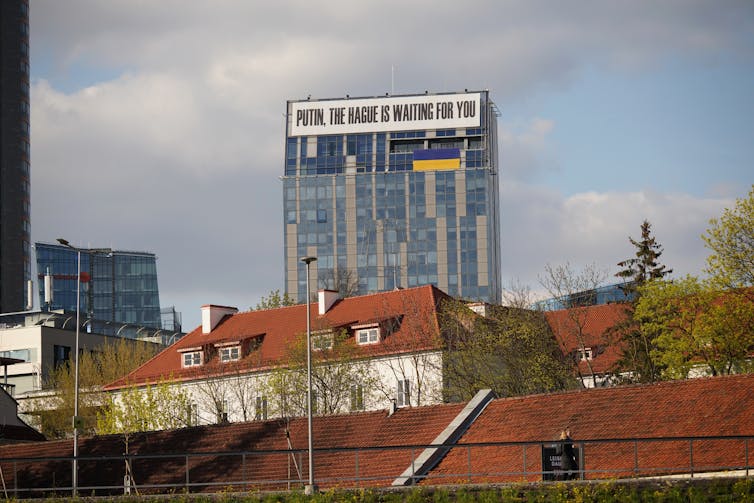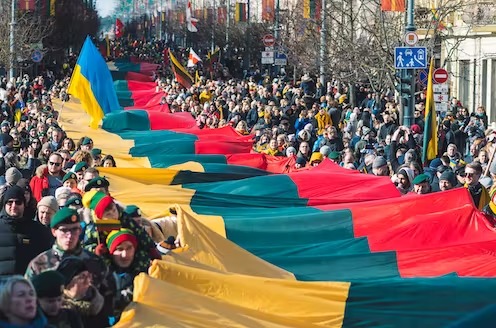In 2008, as part of a “nation branding” exercise – an attempt to give a country an easily recognisable identity – the Lithuanian communication specialists came up with the slogan “Lithuania – a brave country”. At the time, the country’s political elite were sceptical, but today, they identify with the label almost instinctively. Indeed, the small Baltic country has a population of less than 3 million and is in the borderlands of the EU, yet since 2020, it has stood up to three autocratic regimes: Belarus, China, and especially Russia.
Vilnius on all fronts
It all began in August 2020, when, after Belarus’s fraudulent presidential election, which sparked mass protests and violent repression, Lithuania welcomed the leader of the Belarussian opposition Sviatlana Tsikhanouskaya and thousands of her supporters, fleeing the dictatorship of Alexandre Loukachenko. Tikhanovskaïa chose Vilnius as the home of her government-in-exile.
In response, the Loukachenko regime organised an unprecedented migration “crisis” in the region, using state-controlled agencies to give tourist visas to would-be migrants from Africa and the Middle East, housing them in Minsk, and then having them driven to the Lithuanian, Polish and Latvian borders. Those who failed to cross over, suffered violence at the hands of Belarusian authorities.
A year later, in November 2021, Lithuania dared to welcome Taiwan’s economic representation under the title “Taiwanese Representative Office” instead of “Tapei”, as was the case elsewhere in Europe. This provoked the ire of China, which removed Lithuanian products from custom lists and reduced the level of Lithuanian diplomatic representation in the country. The country’s leadership didn’t bend.
The February 2022, the Russian invasion of Ukraine did more than shock the Lithuanian society, it sparked fear: after having spent 45 years under the Soviet regime, the Lithuanians readily identify with the Ukrainian victims of Russian atrocities. It also provoked the feeling that it was imperative to show solidarity with the country that had been brutally attacked and to punish its aggressor.
Unprecedented support
In response, Lithuanians welcomed Ukrainian refugees, organised humanitarian aid and raised funds to support the Ukrainian military. The country’s faithful prayed for peace, those who spoke Russian telephoned the Russian citizens to explain what was really happening in Ukraine and to incite opposition to the war.
Lithuanians did not act alone: as always, they consulted their allies in NATO and the EU (Lithuania joined both organisations in 2004), but in the Euro-Atlantic circles, Lithuanian officials are among the most vocal and determined.
Lithuania was one of the first countries to close its airspace to Russian planes. The country also fought for strong sanctions against Putin’s regime, including stopping the purchase of Russian petrol and gas and closing maritime ports to ships registered in Russia.
In March 2022, the Lithuanian parliament adopted a resolution calling for the United Nations to establish a no-fly zone over Ukraine – one of the President Zelensky’s urgent demands at the beginning of the conflict. In May, another resolution was adopted, calling the war a genocide and Russia a “terrorist state”.
At the beginning of April, after the revelation of atrocities, carried out by the Russian forces, Lithuania expelled the Russian ambassador from Vilnius and withdrew their own ambassador from Moscow. (Around 200 Russian diplomats were expelled from Europe at that time, but unlike in Lithuania, they were not ambassadors.) Lithuania is also one of the countries that started the process to ensure that the Russians, found to be guilty of war crimes, including the leaders, would face international courts.

On a building in Vilnius in May 2022: Dmitriy Drozd/Shutterstock
Some actions were symbolic but nonetheless powerful: the Vilnius Town Hall renamed the road leading to the Russian embassy “Ukrainian Heroes’ Street”. Throughout the country, authorities removed monuments dedicated to Soviet “liberators” that hadn’t yet been removed.
On some occasions, the Lithuanian authorities were even obliged to slow down: on June 17, the country’s customs officials stopped some sanctioned Russian goods destined for Kaliningrad, the Russian enclave, that were meant to transit through the Lithuanian territory. Moscow bristled, leading to fears of an escalation. In response, the European Commission put out additional clarifications on sanction requirements and allowed the shipment to take place.
In October 2022, the chief of staff of the Lithuanian armed forces cautioned the government that it would be unable to transfer to Ukraine some of the arms, as they were essential for the defence of Lithuania itself. The army has already contributed the equivalent of 200 million euros of military aid to Ukraine, which represents at least 13% of the annual defence budget.
The sensitive issue of Russian residents
The president’s chief national security advisor, Kestutis Budrys, recently underlined the importance of the resilience of the civil society, faced with foreign influence. In his words, some Lithuanians are still vulnerable to conspiracy theories and fake narratives, often constructed by Russia, that must be identified and refuted. While the effort is understandable, there is also a risk that having such a strong official line could encourage self-censorship and silence differing opinions.
Since the Soviet times, the three Baltic countries have welcomed substantial Russian minorities. In Lithuania, they make up less than 6% of the population, compared to 25% in Latvia and 24% in Estonia. They haven’t been highly vocal since the beginning of the war, either because they are well integrated or because they do not think it’s the right moment to publicly declare their support for the Russian government.
There is also a more recent Russian diaspora, composed of dissidents who settled in these Baltic countries after 2014 and in greater numbers after February 2022. Vilnius has also become the place for the annual gathering of the Free Russia Forum, reuniting well-known adversaries of Putin, like Garry Kasparov, Vladimir Kara-Murza, Ilia Ponomarev, Andreï Illarionov, Andreï Piontkovskiy, Mikhaïl Khodorkovski and many others. This movement is largely supported by the Lithuanian political classes, which cultivate hope for a democratic and free Russia.
Despite the support for Russian dissidents, the situation in Lithuania remains delicate. In September 2022, Lithuanian authorities (like those in Latvia and Estonia) closed their borders to the Russians, fleeing conscription. The logic was simple: there is a willingness to welcome political dissidents and those who oppose the war, but not those whose primary concern is for their own safety.
The responsibility that the Russian citizens bear for the war and the place that the Russian culture should have in public life in Lithuania is also a matter of debate. A group of experts, gathered by the Ministry of Culture, decided to rename the “Russian Theatre of Vilnius” as the “Old Theatre of Vilnius”. Some disagreed with the measure, as the theatre was one of the rare places where Russian culture, free of Putin’s influence, could be encountered. But the reactions were subdued, as in the case of the decision of the National Opera to “temporarily… refrain from public performances of works by Russian authors as culture in Russia is too closely associated with this country’s aggressive policy”.
The balance between security and freedom is always difficult to establish, as the scholar Mark Neocleous might say. For Lithuania, practically on the frontline of war, it is even more complicated: Russia has become an existential threat, which explains the Lithuanians’ desire to “securitise” a growing number of everyday topics. The country’s diplomats want to rally more states in defence of democratic values at a European and global level. If this project succeeds, it will create a context in which fundamental liberties will be easier to defend – at an international level, and at a national one too.



 JPMorgan Lifts Gold Price Forecast to $6,300 by End-2026 on Strong Central Bank and Investor Demand
JPMorgan Lifts Gold Price Forecast to $6,300 by End-2026 on Strong Central Bank and Investor Demand  BTC Flat at $89,300 Despite $1.02B ETF Exodus — Buy the Dip Toward $107K?
BTC Flat at $89,300 Despite $1.02B ETF Exodus — Buy the Dip Toward $107K?  Elon Musk’s Empire: SpaceX, Tesla, and xAI Merger Talks Spark Investor Debate
Elon Musk’s Empire: SpaceX, Tesla, and xAI Merger Talks Spark Investor Debate 































